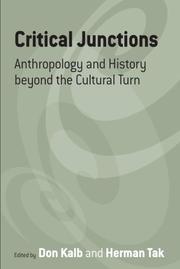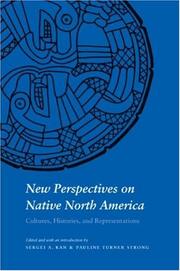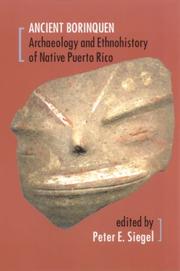| Listing 1 - 10 of 71 | << page >> |
Sort by
|
Book
ISBN: 3110528673 3110530775 9783110530773 9783110530780 3110530783 3110528533 9783110528534 3110528533 Year: 2018 Publisher: Oldenbourg, [Germany]
Abstract | Keywords | Export | Availability | Bookmark
 Loading...
Loading...Choose an application
- Reference Manager
- EndNote
- RefWorks (Direct export to RefWorks)
Experiencing the dimension that lies beyond our empirical grasp of the world has always been a challenge for human beings, for it can expose the limitations of our agency. Such experience, while potentially terrifying, can also furnish a basis for religious faith or hope of a better future. The intercultural essays in this volume analyze ways of dealing with the beyond, including magic, religion, myth, and all-promising utopias.
Ethnohistory. --- Ethnohistorical method --- Historical anthropology --- Historical ethnology --- Anthropology --- Ethnology --- Methodology
Book
ISBN: 9782729841683 2729841687 Year: 2009 Publisher: Paris : Ellipses,
Abstract | Keywords | Export | Availability | Bookmark
 Loading...
Loading...Choose an application
- Reference Manager
- EndNote
- RefWorks (Direct export to RefWorks)
Anthropology --- Animals --- Anthropologie --- Animaux --- Human-animal relationships --- Animals and civilization. --- Domestication. --- Historical anthropology --- History. --- Animals.
Book

ISBN: 9780472071357 0472071351 9780472051359 0472051350 Year: 2011 Publisher: Ann Arbor University of Michigan press
Abstract | Keywords | Export | Availability | Bookmark
 Loading...
Loading...Choose an application
- Reference Manager
- EndNote
- RefWorks (Direct export to RefWorks)
"Stretching back to the 1950s, interdisciplinary work between anthropology and history has taken diverse expressions. Yet it has developed with more coherence since the 1980s, largely in response to the declining promise of global modernity and the rise of poststructuralism and deconstructionism. Through a critical and contemporary engagement with this wave of scholarship, this volume challenges readers to think of work at the crossroads of anthropology and history as transdisciplinary and anthrohistorical, moving beyond a partial integration of the disciplines as it critically evaluates their assumptions and trajectories. This approach permits Anthrohistory: Unsettling Knowledge, Questioning Discipline to present a broader perspective that unsettles the constraints of existing academic practice. The volume does not offer a blueprint for fulfilling this goal, but rather a variety of positions taken by anthrohistorians who work in diverse contexts. Adopting an innovative and accessible style, Anthrohistory opens a provocative window into broader questions of interdisciplinarity, representation, epistemology, methodology, and social commitment."--Back Cover..
Ethnohistory. --- Ethnohistory --- Ethnohistorical method --- Historical anthropology --- Historical ethnology --- Anthropology --- Ethnology --- Methodology
Book
ISBN: 9004370978 900437096X 9789004370975 9789004370968 9789004370951 9004370951 9789004370968 Year: 2018 Publisher: [S.l.] : BRILL SENSE,
Abstract | Keywords | Export | Availability | Bookmark
 Loading...
Loading...Choose an application
- Reference Manager
- EndNote
- RefWorks (Direct export to RefWorks)
A Man Comes from Someplace is a story of a lost world, a story in history of a multi-generational Jewish family from a shtetl in Ukraine before WWI. As cultural study, the narrative draws upon the oral stories of the author’s father, family letters, eyewitness accounts, immigration papers, et cetera, and cultural research. The narrative becomes a transformative space to re-present story as performance, a meta-narrative, and an auto-ethnography for the author to reflect upon the effects of the stories on her own life, as daughter of a survivor, and as teacher/scholar. Summerfield raises questions about immigration, survival, resilience, place and identity, how story functions as antidote to trauma, a means of making sense of the world, and as resistance, the refusal to be silenced or erased, the insistence we know the past and remember those who came before. In 2011, she found her way back to the place her family came from in Ukraine. The book is now being read by students in their ESL classes in Novokoonstantinov, Ukraine.
Jews --- Ethnohistory. --- Families --- Family history (Sociology) --- Ethnohistorical method --- Historical anthropology --- Historical ethnology --- Anthropology --- Ethnology --- History. --- Methodology
Periodical
Abstract | Keywords | Export | Availability | Bookmark
 Loading...
Loading...Choose an application
- Reference Manager
- EndNote
- RefWorks (Direct export to RefWorks)
Dubrovnik --- Mediterranean --- history --- historical demography --- historical anthropology --- history of art and literature --- Arts and Humanities --- History --- dubrovnik --- mediterranean
Book
ISBN: 2130536549 9782130536543 Year: 2005 Volume: *131 Publisher: Paris: PUF,
Abstract | Keywords | Export | Availability | Bookmark
 Loading...
Loading...Choose an application
- Reference Manager
- EndNote
- RefWorks (Direct export to RefWorks)
L'anthropologie historique de Michèle Duchet apparaît, en perspective, comme une longue méditation sur la constitution d'un objet qu'on nommera ethnographiable. Cette œuvre d'inquiétude parle ouvertement de la trahison de l'idéal humaniste des Lumières, de son racisme latent ou avéré. Ainsi qu'elle l'explique, les Philosophes " ont cherché à remédier aux abus, et par là contribué au maintien de l'ordre établi ". Cette perception critique a certainement nourri une ambivalence intime. On a le sentiment que Michèle Duchet aime le siècle des Lumières pour son universalisme et qu'elle en refuse " les refus ". Cette distance lucide lui a permis de considérer l'époque des Lumières non comme un phare pour notre conduite mais, à la manière de Foucault qui voulait penser " l'autre dans le temps de notre propre pensée ", elle y aura vu une sorte de " culture " séparée de notre temps, qu'il convenait d'abord d'étudier dans sa langue propre.
Anthropology --- Philosophy, French --- Enlightenment --- Anthropologie --- Philosophie française --- Siècle des Lumières --- France --- Intellectual life --- Vie intellectuelle --- Language and culture --- Social history --- Literary studies - Historical anthropology - 16th-19th centuries --- Literary studies - Historical anthropology - 16th-19th centuries. --- Anthropology. --- Language and culture. --- Social history. --- Philosophie française --- Siècle des Lumières --- Literary studies --- Historical anthropology --- 16th-19th centuries

ISBN: 1845450086 1845450299 1782389628 9781845450298 9781845450083 9781782389620 Year: 2006 Publisher: New York, [New York] ; Oxford, [England] : Berghahn Books,
Abstract | Keywords | Export | Availability | Bookmark
 Loading...
Loading...Choose an application
- Reference Manager
- EndNote
- RefWorks (Direct export to RefWorks)
The “cultural turn” has been a multifarious and pervasive phenomenon in Western universities and modes of social knowledge since the early 1980s. This volume focuses on the conjunction of two disciplines where both the analytic promises as well as the difficulties involved in the meeting of humanist and social science approaches soon became obvious. Anthropologists and historians have come together here in order to recapture, elaborate, and criticize pre-Cultural Turn and non-Cultural Turn modes of analysing structures of experience, feeling, subjectivity and action in human societies and to highlight the still unexploited possibilities developed among others in the work of scholars such as Norbert Elias, Max Gluckman, Eric Wolf, E.P. Thompson and Raymond Williams.
Ethnology. Cultural anthropology --- History as a science --- Anthropology --- Ethnohistory. --- Historiography. --- Methodology. --- Ethnohistory --- Historiography --- Historical criticism --- History --- Authorship --- Ethnohistorical method --- Historical anthropology --- Historical ethnology --- Ethnology --- Methodology --- Criticism
Book
ISBN: 3850281884 Year: 1986 Publisher: Horn : Berger,
Abstract | Keywords | Export | Availability | Bookmark
 Loading...
Loading...Choose an application
- Reference Manager
- EndNote
- RefWorks (Direct export to RefWorks)
Ethnology --- -Ethnohistory --- -Ethnohistorical method --- Historical anthropology --- Historical ethnology --- Anthropology --- Cultural anthropology --- Ethnography --- Races of man --- Social anthropology --- Human beings --- Methodology --- Ethnohistory --- -Ethnology --- Ethnohistorical method

ISBN: 1280374705 9786610374700 080325363X 9780803253636 0803227736 0803278306 9780803227736 9780803278301 9781280374708 Year: 2006 Publisher: Lincoln : Baltimore, Md. : University of Nebraska Press, Project MUSE,
Abstract | Keywords | Export | Availability | Bookmark
 Loading...
Loading...Choose an application
- Reference Manager
- EndNote
- RefWorks (Direct export to RefWorks)
In this volume some of the leading scholars working in Native North America explore contemporary perspectives on Native culture, history, and representation. Written in honor of the anthropologist Raymond D. Fogelson, the volume charts the currents of contemporary scholarship while offering an invigorating challenge to researchers in the field. The essays employ a variety of theoretical and methodological approaches and range widely across time and space. The introduction and first section consider the origins and legacies of various strands of interpretation, while the second part examines the relationship among culture, power, and creativity. The third part focuses on the cultural construction and experience of history, and the volume closes with essays on identity, difference, and appropriation in several historical and cultural contexts. Aimed at a broad interdisciplinary audience, the volume offers an excellent overview of contemporary perspectives on Native peoples.
Ethnology --- Ethnohistory --- Indians of North America --- Ethnohistorical method --- Historical anthropology --- Historical ethnology --- Anthropology --- Social life and customs. --- History --- Customs --- Methodology --- Fogelson, Raymond. --- North America --- Turtle Island (Continent)

ISBN: 0817381503 9780817381509 0817352384 9780817352387 0817314717 0817352384 9780817314712 9780817352387 Year: 2005 Publisher: Tuscaloosa : University of Alabama Press,
Abstract | Keywords | Export | Availability | Bookmark
 Loading...
Loading...Choose an application
- Reference Manager
- EndNote
- RefWorks (Direct export to RefWorks)
Native American cultures of Puerto Rico prior to the arrival of the Spanish in 1493.A book on the prehistory of a modern geopolitical entity is artificial. It is unlikely that prehistoric occupants recognized the same boundaries and responded to the same political forces that operated in the formation of current nations, states, or cities. Yet, archaeologists traditionally have produced such volumes and they
Ethnohistory --- Indians of the West Indies --- Ethnohistorical method --- Historical anthropology --- Historical ethnology --- Anthropology --- Ethnology --- Indigenous peoples --- History. --- Antiquities. --- Methodology --- Puerto Rico --- Antiquities --- History
| Listing 1 - 10 of 71 | << page >> |
Sort by
|

 Search
Search Feedback
Feedback About UniCat
About UniCat  Help
Help News
News